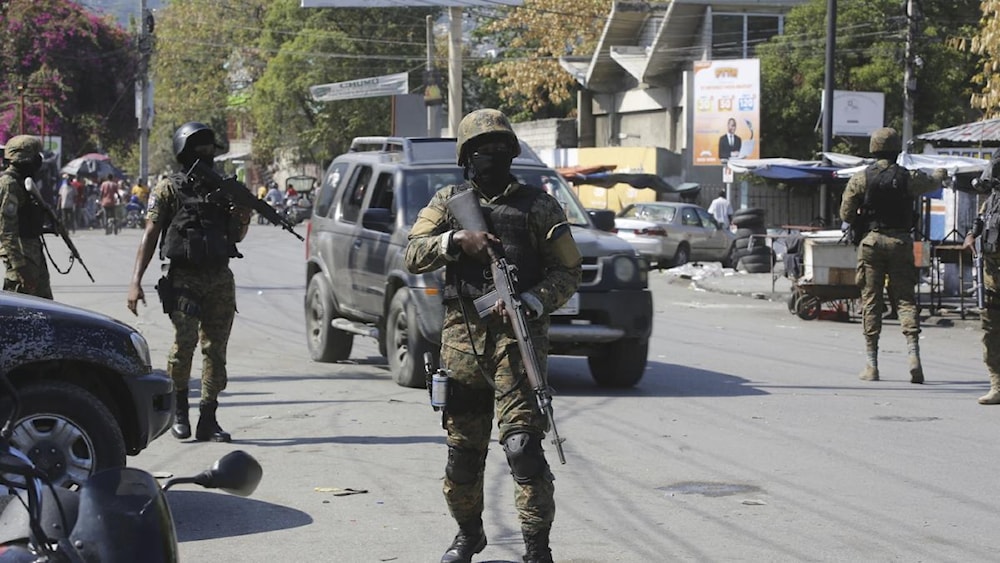Haitian police struggle to repel gang attacks as security deteriorates
Haitian security forces and palace guards in the capital Port-au-Prince establish a security perimeter around one of the downtown police stations, which had been earlier stormed by armed gang members.
-

Members of the General Security Unit of the National Palace, USGPN, set up a security perimeter around one of the three downtown stations after police fought off an attack by gangs the day before, in Port-au-Prince, Haiti, on March 9, 2024. (AFP)
Police and palace guards in Haiti's capital Port-au-Prince launched joint operations on Saturday to reclaim certain streets following massive attacks by gangs on several police stations.
Assisted by an armored truck, guards from the National Palace attempted to establish a security perimeter around one of the downtown stations after police repelled an attack by gangs on Friday night.
According to Haiti's police union SYNAPOHA, around 10 police stations have been destroyed, and at least 15,000 people fled parts of Port-au-Prince in the past week.
A prominent leader of a Haitian gang issued a stark warning on March 5, asserting that the escalating turmoil in the capital, Port-au-Prince, could lead to civil war and "genocide" unless Prime Minister Ariel Henry steps down.
Read more: Haiti ex-coup leader wants presidency and PM resignation
Armed clashes between security forces and gangs erupted on February 29 while acting President Ariel Henry, was on a visit in Kenya. While he was expected to step down last month, he found himself confronted by armed criminal gangs orchestrating a coordinated assault to ouster him while outside the country.
Haiti's main airport also came under attack by mobs while the neighboring Dominican Republic refused to grant permission for the prime minister to land in the country. “Henry is not welcome in the Dominican Republic for safety reasons," authorities said in a statement.
Read more: How the US continues to orchestrate chaos in Haiti: UnHerd
It said the security situation in Haiti is “totally unsustainable” and “poses a direct threat to the safety and stability of the Dominican Republic”.
"The situation could deteriorate even further if a peacekeeping force is not implemented urgently to restore order," the statement continued.
Henry has been unable to return to Port-au-Prince since.
Following continous attacks on major government facilities, Haitian officials extended on Thursday the state of emergency and curfews in night hours.
'Dire situation'
Caribbean leaders have called for an emergency meeting on Monday in Jamaica to address what they describe as Haiti's "dire" situation. They have invited the United States, France, Canada, the UN, and Brazil to attend.
The Caribbean Community (Caricom) has been working for months to persuade political actors in Haiti to form a transitional unity government.
So far, efforts to broker a solution have been unsuccessful.
Caricom, the 15-nation Caribbean bloc, said in a statement late Friday that “the situation on the ground remains dire”.
Read more: Assassinated Haitian President's widow charged alongside ex-PM
The Caricom statement said that while regional leaders remain deeply engaged in trying to bring opposition parties and civil society groups together to form a unity government, “the stakeholders are not yet where they need to be”.
“We are acutely aware of the urgent need for consensus to be reached,” the statement read. “We have impressed on the respective parties that time is not on their side in agreeing to the way forward.”
US Secretary of State Antony Blinken and Kenyan President William Ruto discussed the Haiti crisis earlier, emphasizing their commitment to a multinational security mission to restore order.
Kenya had previously announced its readiness to lead the force, but domestic legal issues have delayed the mission.
Read more: Tracing the roots of Haiti's US-sponsored troubles
The Haitian Prime Minister visited Kenya to advocate for a UN-backed deployment of a Kenyan police force to combat gangs in Haiti, but a Kenyan court ruled the deployment unconstitutional in January.
Blinken also conversed with Henry earlier this week, stressing the necessity for an "urgent" political transition.
Brian Nichols, the senior US diplomat for the Western hemisphere, stated that Blinken emphasized "the urgent need to accelerate the transition to a broader, more inclusive government today" during the discussion.

 4 Min Read
4 Min Read








